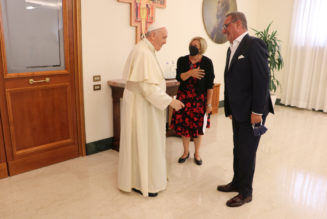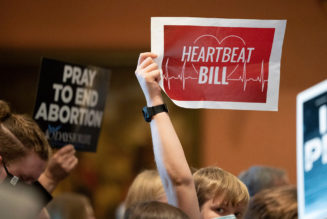
In every life, there comes a moment where we find ourselves brought to our knees, a moment when we are immersed in something tragic and personally gutting, and our questions seem unending. It is a “rubber meets the road” moment, when even people of faith will ask themselves whether they truly believe all they proclaim and people who say they have no faith find themselves casting out pleas to heaven. When a popular artist seems to be saying he or she has met such a moment, fans notice.
Ever since the Beatles took the then-unprecedented step of printing their lyrics on the back cover of their “Sgt. Pepper’s Lonely Hearts Club Band,” included lyrics have helped a listener to quickly become familiar enough with a new song to embrace its mood and message for one’s own. For some, a close examination of an artist’s lines has become an effort at intimacy — a hunt for hints and clues fans believe will help them better connect with what their favorite performers are saying between the lines, as it were — what deep life experiences or insights the artist may be trying to communicate specifically to those who can understand, and identify.
Such is the case with a song from Taylor Swift’s recently dropped album, “Midnights (3am Edition).” The song “Bigger Than the Whole Sky” almost immediately had fans speculating about its meaning — specifically, as to whether Ms. Swift has lately suffered the loss of a child through miscarriage.
Unless the composer states her purpose outright, it is all but impossible to know whether such speculation is on point, but the lyrics to “Bigger Than the Whole Sky” — poignant, wistful, grieved and spiritually confused — seem to bear out the hypothesis.
“Goodbye, goodbye, goodbye
You were bigger than the whole sky
You were more than just a short time
And I’ve got a lot to pine about
I’ve got a lot to live without …”
Women who have suffered a miscarriage will tell you that the loss, usually inexplicable, feels like a promise left unkept, a denial of what seemed a new force of unlimited potential, and a new expression of love, taken away before the world had seen its beauty, rather like a flake of snow, melted before it ever reached the ground.
“I’m never gonna meet
What could’ve been, would’ve been
What should’ve been you
What could’ve been, would’ve been you …”
If the song is, in fact, a grief-filled declaration of such a private loss, it is also a monologue that is inspiring online discussion of a subject that society too often greets with strained silence. On hearing of a miscarriage, some seem to believe the less said to a grieving parent, the better — as though this death were not a real death or, in any case, not one whose mourning should evince more than a token notice. All too often, news of a miscarriage meets responses that, while perhaps well-intended, only deepen the wound (“There must have been something wrong with that baby; nature is merely saving you from something awful”), or miss the mark completely. “You can try again,” is small comfort to a parent who knows that the child gone unmet was not interchangeable with another child, any more than any family would believe one sibling could replace another.
On Reddit and other social media platforms, both men and women have taken “Bigger Than the Whole Sky” as permission to lament their own losses. They are sharing their experiences of miscarriage but also of the ongoing ache attending the deaths of parents, siblings and friends, abortions regretted, and even of relationships that ended without the closure of questions answered.
“Divorcing after 12 years of marriage — I’m the one who’s being left. Sobbing on repeat,” writes one commenter.
“I lost my mom to cancer just 3 weeks before this album came out,” says another. “… The lyrics fit too well to what I am feeling right now. All the things that should have been but now won’t. She was just way too young to be gone already.”
If death and loss are subjects too seldom discussed in society, or spoken of only in hushed tones, the thread at Reddit has encouraged some to broaden their first impressions: “I can’t hear this as anything but a song about miscarriage [but] after hearing this, that interpretation totally hits different.”
“I had an abortion. … I regret it, and I’m grieving so much and this song is making me bawl my eyes out.” Regret over choosing an abortion is something else we don’t talk enough about.
While Ms. Swift does not claim to be pro-life or a theologian, “Bigger” nevertheless touches on feelings and questions that are common to all of us in the first thrust of wrenching loss, and which we instinctively direct heavenward:
“Did some force take you because I didn’t pray
Every single thing to come has turned into ashes
‘Cause it’s all over
It’s not meant to be
So I’ll say words I don’t believe …”
Loss is the great leveler of humanity, the thing that takes us outside of all that we think we know of ourselves. In the bewildering realization of what is gone, those who believe in an All-Loving God will sometimes catch themselves stumbling into questions about whether their sins, or their sins of omission, have somehow invited the actions of an angry, vengeful God in whom they don’t actually believe. Likewise, unbelievers, against all of their stated doubts, may find themselves unguardedly crying out in surprised prayer, begging that their pain be neither real nor inescapable.
That common sense of disorientation and vast unknowing is something worth talking about; it is theology worth exploring, together. Whatever Taylor Swift is indeed writing about, she’s given us all a worthwhile conversation.
Elizabeth Scalia is the culture editor for OSV News.
Join Our Telegram Group : Salvation & Prosperity









